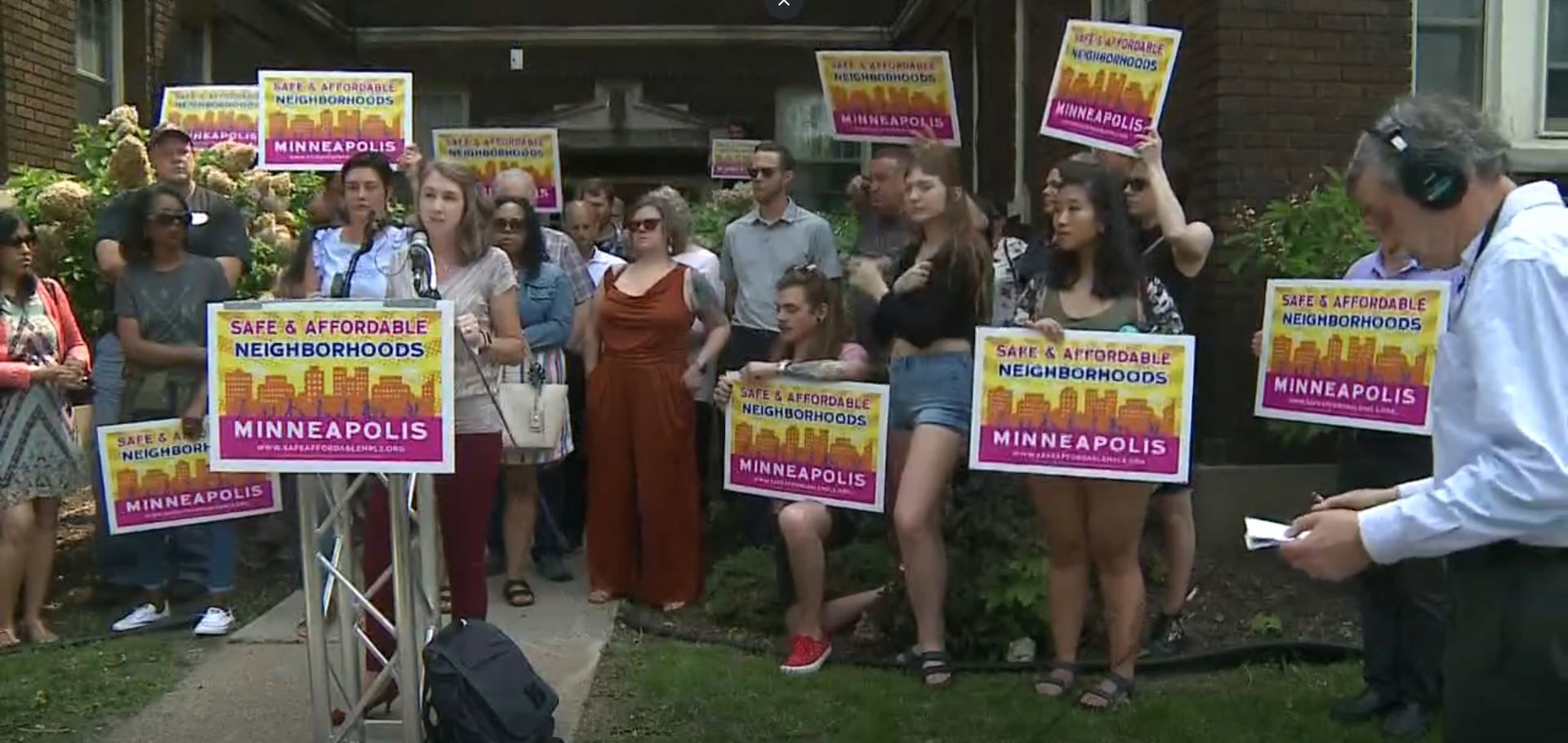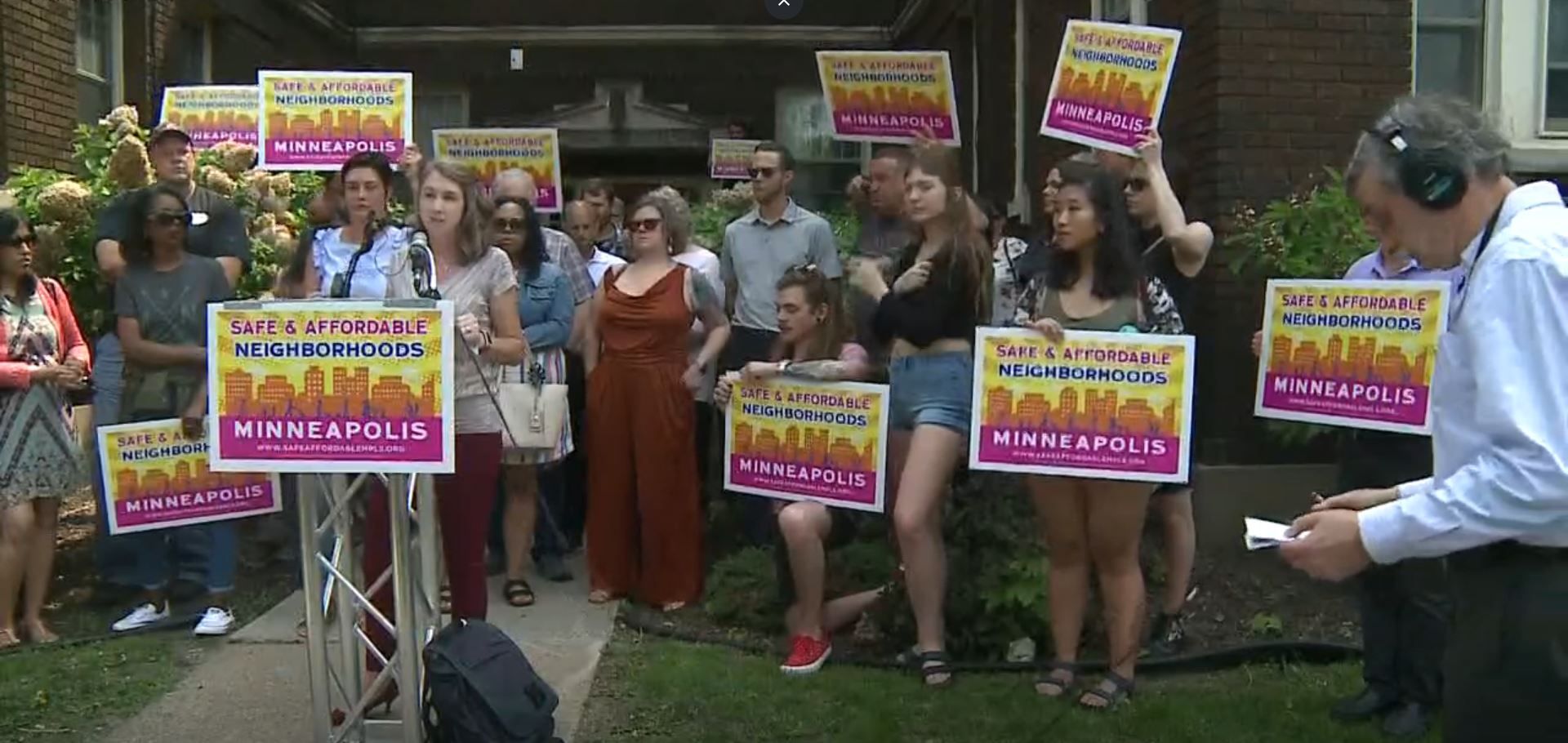Minneapolis Real Estate Lobbyist Group Rallies Landlords, Developers Against Proposed Expansion of Tenant's Rights
"...this ordinance, if passed, would bar landlords from turning away applicants because of a felony conviction..."


Earlier this week, an agglomeration of landlords, condo developers, and various other enemies of the people of Minneapolis gathered at the intersection of West 26th Street and Blaisdell Avenue in the Whittier neighborhood of South Minneapolis, in order to hold a public press conference to declare their opposition to a new ordinance proposed by the Minneapolis City Council that would dis-allow/make un-enforceable many common barriers to entry encountered by potential tenants seeking residence, such as prior evictions, felony records, and failure to meet a minimum credit score that is typically arbitrarily set by the landlord. This coalition was assembled under the leadership of one Nichol Beckstrand, president of the Minnesota Multi-Housing Association, a lobby for the Minnesota residential real estate and property development industry, whose purpose is to represent the interests of career landlords, real estate moguls, and other assorted petty-bourgeois & bourgeois exploiters in the city, county, and state legislative bodies of Minnesota.
More specifically, this ordinance, if passed, would bar landlords from turning away applicants because of a felony conviction, provided the conviction occurred 5 years or more from the time of rental application. This also applies to misdemeanors which occurred 2 years or more from the time of rental application, and arrests that never resulted in convictions as well. There are exceptions to these proposed rules as well based on certain criminal convictions that demonstrate a greater level of threat to a community: certain sex crimes and violent crimes, arson, and racketeering could still be used as reasons for rejection. Denial of application due to evictions that occurred 3 or more years from the time of application would also be dis-allowed, as would be denial based solely on poor credit. Landlords would also no longer be allowed to reject applicants who have committed crimes that are no longer illegal in Minnesota, a clause which could prove particularly profound in the event the state of Minnesota eventually legalizes recreational marijuana as many other states have done in recent years.
Nichol Beckstrand and the supporters she rallied put forth their rationale for opposition in the form of supposed concerns about neighborhood safety and potential increases in crime affecting other renters. At the press conference, many held signs saying “safe and affordable neighborhoods for Minneapolis”; a particularly ironic and disingenuous gesture, given the condo developers and career landlords, whose interests MMHA represents, are primary drivers of the increasing *un*-affordability of housing in the city. We have to wonder if allowing greater access to housing for people with poor credit or prior criminal records might have, if anything, the opposite effect as that which Nichol and her cohorts are so concerned with. Instability in access to housing (along with other necessities of life) is one of the primary drivers of criminal recidivism. Easing restrictions on tenancy may very well result in a *de*crease in certain crimes, given that theoretically many more people who currently do not have access to much of the rental units available in Minneapolis might have access if this ordinance was passed and thus provide increased housing stability and decrease the chance of recidivism for many people in these populations. Considering also the history of legal cultural, political, and economic discrimination in Minneapolis experienced by many groups, especially (but not solely) the nationally-oppressed segments of the working classes, easing such restrictions also could have profound implications on housing justice for many of these marginalized social groups. Given various historical and current phenomena such as redlining, blockbusting, suburbanization, capital flight, etc. (and how those discriminatory policies set the stage for the onslaught of gentrification currently underway in the city), as well as the fact that the majority of felony convictions are for non-violent drug offenses of which people of oppressed nationalities, hyper-policed in their neighborhoods under the guise of the racist “War on Drugs”, make up the vastly disproportionate bulk, it seems a loosening on tenancy restrictions for people with certain felony convictions of a certain age is the absolute least the city of Minneapolis can do to address this historical and persisting oppression, especially given that Minneapolis currently has one of the largest equity gaps in the nation for Black citizens, in terms of core socioeconomic metrics in comparison with those of white citizens.
These landlords and developers organized by the MMHA feign concerns of neighborhood safety and "protecting the community" and use them as scare tactics alongside comments that if the ordinance were passed that landlords wouldn't be able to rent to housing-insecure groups (which, considering that's exactly who this ordinance would help, Minneapolitans should view this is as a direct threat to their housing security and ability to find rental residence, since it implies that these landlords will actively and deliberately find ways to circumvent the ordinance should it pass) and that it would totally stifle all new affordable housing construction (which will only ever be meaningless platitudes coming from the MMHA, because the properties being developed by those it represents are anything BUT affordable by any measure of affordability that has any actual relation to the conditions of working people in this city), but we must be vigilant in exposing the real reason this assortment of landlords, condo developers, and other parasites are opposing this proposed ordinance: they are opposed because it is against their fundamental class interests as landlords, who occupy the role of entirely-superfluous middlemen who use their wealth to buy and hoard property to make a living from rent for a living instead of performing honest work, all as an increasing population of un-housed people languish in the streets outside units left vacant by the respective landlord because very few people can afford the rents the landlord/developer are seeking. Because, at the end of the day, the interests of landlords and tenants are fundamentally and antagonistically opposed: tenant's interests are for safe, well-maintained, and affordable housing, while a landlord's income depends on charging the highest rent possible while putting as little income back into building + unit maintenance and safety inspections as possible - in short, to provide the least-maintained and most un-safe housing as possible, at the highest rent possible. Anything that increases the leverage of tenants decreases that of the landlords, and vice-versa. They oppose it simply because it is not as profitable for them to have to accept renting to working-class people and others who experience these barriers to affordable housing, as it is to house only those willing and able to pay the increasingly exorbitant rents they expect to charge.
Due to the ever-growing housing crisis in Minneapolis and the continued onslaught of gentrification of Minneapolis' majority-oppressed-nationality proletarian neighborhoods, this measure, while sorely inadequate in the grand scheme of things, is an objectively progressive measure which would benefit the poorest and most marginalized of Minneapolitans, at the expense of those who exploit them. At the same time, we must keep sight of the fact that these are all symptoms of the larger problem of housing development being directed by the logic of capitalist profit-motive than the social needs of society writ large and objective needs of, and right to, housing for all people, and that measures like the proposed ordinance are merely inadequate band-aids on the gaping, necrotic wound that is profit-driven housing development under capitalism.
The proposition in question is slated to be voted on by the City Council later this summer.
